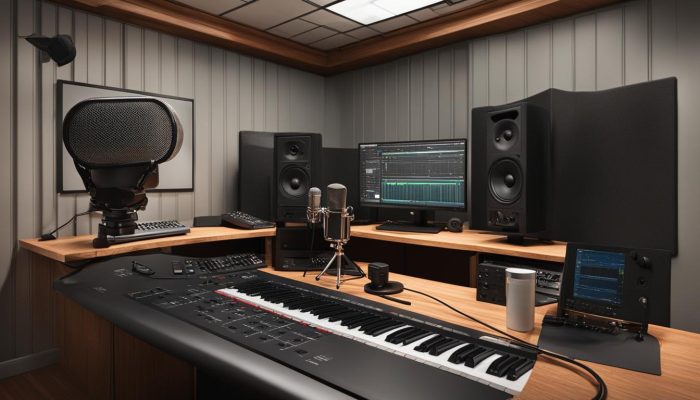Are you passionate about using your voice to bring characters to life? Do you dream of pursuing a career in the exciting world of voice acting? Look no further! In this article, I will guide you through the process of becoming a voice over artist and show you how to earn money in this field. Whether you’re just starting out or looking to take your voice acting career to the next level, this comprehensive guide will provide you with the information you need to succeed.
As a voice over artist, you have the opportunity to showcase your unique talent and make a living doing what you love. From commercials and audiobooks to movies, TV shows, and video games, there is a wide range of voice over jobs waiting for you. But before diving in, it’s essential to understand the qualifications and equipment needed, as well as the steps to market yourself effectively in this competitive industry.

Key Takeaways:
- Voice over artists have the opportunity to turn their passion for voice acting into a lucrative career.
- There are various types of voice over jobs available, including commercials, audiobooks, movies, TV shows, and video games.
- Developing technical skills and having the necessary equipment is crucial for creating high-quality voice recordings.
- Marketing yourself and finding voice over jobs can be done through online platforms, self-promotion, and networking.
- Becoming a voice over artist offers benefits such as flexibility, the ability to set your own rates, and multiple income streams.
All About Voice Acting
Voice acting is an exciting and diverse field that offers numerous opportunities for individuals with different voices and talents. Contrary to popular belief, you don’t need a deep or smooth voice to become a voice over artist. In fact, there are plenty of opportunities for people with regular voices. Whether you have a unique voice, excellent acting skills, or a knack for impersonations, voice acting allows you to showcase your abilities and bring characters to life.
Experience plays a vital role in a successful career in voice acting. While formal training is not always necessary, it can help you hone your skills and gain a competitive edge in the industry. Many voice actors start by taking acting classes or workshops to learn techniques that can enhance their performances. Additionally, gaining experience through community theater, radio plays, or volunteer work can provide valuable insights and help you build a portfolio of voice over work.
When it comes to voice over artist jobs, the opportunities are vast. From commercials and audiobooks to movies, TV shows, video games, and more, there is a wide range of projects that require the talent of voice actors. Each type of job offers unique challenges and requirements, allowing voice actors to showcase their versatility and adaptability. Whether you’re voicing an animated character, narrating a documentary, or recording a radio ad, each project presents an opportunity to explore different genres and styles.
| Type of Voice Acting Work | Description |
|---|---|
| Commercials | Recording voice overs for TV and radio advertisements |
| Audiobooks | Narrating books for audio format |
| Movies and TV Shows | Providing voices for characters in films and television programs |
| Video Games | Voicing characters and providing narration for video games |
| Animation | Bringing animated characters to life through voice acting |
As you can see, voice acting offers a dynamic and rewarding career path for those with a passion for performing and a love for the spoken word. By gaining experience, honing your skills, and exploring different types of voice over artist jobs, you can carve out a successful career in the fascinating world of voice acting.
Technical Skills & Equipment Needed
In addition to having a great voice, voice over artists need to develop technical skills and have the necessary equipment. Training is important to enhance your voice acting skills and learn proper recording techniques. Setting up a home recording studio with minimal investment is crucial for providing high-quality recordings. We will provide guidance on voice over training options and recommend essential tools and equipment for creating crystal clear recordings.
Voice Over Training
When it comes to voice over training, there are various options available to help you improve your skills and refine your craft. Consider enrolling in voice over classes or workshops, either in-person or online. These training programs can provide valuable insights into the industry, help you develop your vocal range and control, and teach you the techniques needed to excel in different types of voice over work.
Additionally, there are numerous voice over training courses and resources available online, ranging from free tutorials to comprehensive paid programs. These courses can cover topics such as script reading, character development, enunciation, and microphone techniques. Investing time in voice over training will not only enhance your abilities but also give you the confidence to deliver professional performances.
Essential Voice Over Equipment
Creating high-quality voice recordings requires having the right equipment. While professional studios have specialized setups, setting up a basic home recording studio is an affordable option for voice over artists. Here are some essential tools and equipment to consider:
| Equipment | Description |
|---|---|
| Microphone | A good-quality microphone is essential for capturing clear and crisp voice recordings. Consider investing in a condenser microphone, which is commonly used in voice over work. |
| Pop Filter | A pop filter helps reduce plosive sounds (‘p’ and ‘b’ sounds) that can create unwanted distortion in the recordings. It is placed in front of the microphone. |
| Headphones | A pair of closed-back headphones is important for monitoring your recordings and ensuring the audio quality is optimal. |
| Audio Interface | An audio interface acts as a bridge between your microphone and computer, allowing you to capture and process the sound signals. |
| Acoustic Treatment | Depending on your recording space, adding acoustic treatment materials such as foam panels or bass traps can help minimize echo or background noise. |
These are just the basics to get you started. As you progress in your voice over career, you may consider exploring additional equipment like a microphone stand, soundproofing solutions, and audio editing software to further enhance your recordings.
Remember, investing in good training and equipment is essential for delivering professional voice over work. By honing your skills and creating high-quality recordings, you can stand out in the competitive voice acting industry and increase your chances of landing exciting voice over opportunities.
How to Market Yourself
Once you have acquired the necessary skills and equipment to become a voice over artist, the next step is to market yourself effectively and find voice acting work. There are various strategies and platforms to help you connect with potential clients and land voice over jobs. By utilizing self-promotion techniques and networking within the industry, you can increase your chances of success.
The Power of Online Platforms
Online platforms such as Fiverr, Upwork, and Voices.com have revolutionized the way voice over artists find work. These platforms provide a space for you to showcase your talent, create a professional profile, and bid on or respond to job postings. It’s important to optimize your profile by including samples of your work, a compelling bio, and competitive rates. Remember to tailor your proposals to each specific job and highlight your unique selling points to stand out from the competition.
Self-Promotion and Networking
In addition to utilizing online platforms, self-promotion is key to marketing yourself as a voice over artist. Build an online presence by creating a professional website or blog where potential clients can learn more about your services. Showcase your portfolio, testimonials from satisfied clients, and any notable achievements or awards. Utilize social media platforms like LinkedIn, Twitter, and Facebook to network with industry professionals, join voice acting communities, and stay up-to-date with the latest opportunities.
Networking within the industry is crucial for finding voice over work. Attend voice acting conferences, workshops, and events to connect with casting directors, agents, and other voice actors. Building relationships with these individuals can lead to referrals and future collaborations. Remember, word-of-mouth recommendations are often highly valuable in the voice acting industry.
Building a Successful Career
Consistency is key when it comes to marketing yourself as a voice over artist. Continuously update your portfolio with new demos and projects to showcase your growth and versatility. Stay proactive by regularly seeking out new opportunities and reaching out to potential clients. Always deliver high-quality work on time and maintain professional communication with clients. With persistence and dedication, you can build a successful career in voice acting.

Summary:
While a career in voice over can be rewarding, it’s important to consider the potential downsides such as the time-consuming nature of the profession, the solitude that comes with working in a home recording studio, the cost of equipment, and the need for continuous training. By being aware of these challenges and preparing for them, aspiring voice over artists can navigate the industry successfully and make informed decisions about their career path.
Voice Over Artist Salary Information
As a voice over artist, your earning potential can vary depending on several factors such as experience, the type of work you do, and the demand for your services. On average, voice actors charge an hourly rate of around $200-300. This can translate to an annual salary of $50,000-70,000.
When it comes to charging for voiceover work, you have the flexibility to set your own rates. Some voice actors prefer to charge per hour, while others prefer to charge per project. The choice ultimately depends on your personal preference and the specific requirements of each job.
As you gain more experience and build a reputation in the industry, you have the potential to increase your rates. Voice actors with established careers can earn even higher salaries, with some top professionals earning millions of dollars.
| Experience Level | Average Hourly Rate | Annual Earnings |
|---|---|---|
| Beginner | $200 | $50,000 |
| Intermediate | $250 | $60,000 |
| Advanced | $300 | $70,000 |
It’s important to remember that these figures are averages and can vary based on individual circumstances. Factors such as the scope and complexity of the project, your level of expertise, and the client’s budget can all influence your rates. Market demand and competition within the voice over industry can also impact the fees you charge.

Charging for Voiceover Work
When considering how to charge for your voiceover work, it’s essential to factor in the time and effort involved in each project. This includes not only the time spent recording, but also the pre-production and post-production tasks such as script analysis, auditioning, and editing.
For shorter projects such as commercials or radio spots, you may choose to charge a flat fee. This can be based on the length of the script, the expected usage of the recording, or a combination of factors. For longer projects, such as audiobooks or e-learning courses, it’s common to charge on a per finished hour (PFH) basis.
Ultimately, it’s important to find a pricing structure that aligns with your skills, expertise, and the value you provide as a voice over artist. Consider the market rates, your level of experience, and the specific requirements of each project to ensure you are compensated fairly for your work.
Different Types of Voice Acting Work
As a voice over artist, you have the opportunity to work on a diverse range of projects across various industries. Whether it’s films, television programs, radio, video games, audiobooks, phone systems, or live events, there is a wide array of voice acting jobs available for you to showcase your talent.
When it comes to films, you can lend your voice to narrate movies in different languages or provide voices for animated films and documentaries. Television programs also offer voice over opportunities, whether it’s voicing commercials, promos, or providing voiceovers for specific characters or narration. Voice actors are also in demand for radio ads and audio dramas, bringing life to advertisements and captivating stories.
In the world of video games, your voice can be featured in beloved characters, bringing them to life and immersing players in captivating storylines. Audiobooks are another avenue for voice over work, where you can narrate bestselling novels and engage listeners with your storytelling skills. Phone systems often require voice actors to provide clear and professional voice prompts for automated phone menus. Additionally, live events such as conferences and presentations often require voice actors to provide live announcing or serve as event hosts.
| Types of Voice Acting Work | Examples |
|---|---|
| Films | Narrating foreign language films Providing voices for animated films |
| Television Programs | Voicing commercials and promos Providing voiceovers for characters/narration |
| Radio | Voicing radio ads Participating in audio dramas |
| Video Games | Voicing characters in video games |
| Audiobooks | Narrating bestselling novels |
| Phone Systems | Providing voice prompts for automated phone menus |
| Live Events | Live announcing Event hosting |
With such diverse opportunities, voice acting offers a dynamic and rewarding career path for those with a passion for using their voice to captivate audiences and bring characters to life.
FAQ
What is voice acting?
Voice acting is the art of providing your voice for various projects such as commercials, audiobooks, movies, TV shows, video games, and more.
Do I need a special voice to become a voice over artist?
No, you don’t need a deep or smooth voice to become a voice over artist. There are plenty of opportunities for people with regular voices.
What qualifications and experience do I need for a career in voice acting?
While having a great voice is important, voice over artists also need to develop technical skills and have the necessary equipment. Training is crucial to enhance your voice acting skills and learn proper recording techniques.
What equipment do I need to set up a home recording studio?
Setting up a home recording studio with minimal investment is crucial for providing high-quality recordings. Essential tools and equipment include a microphone, headphones, a pop filter, and audio editing software.
How can I find voice over jobs?
There are several online platforms that connect voice actors with clients, such as Fiverr, Upwork, and Voices.com. Additionally, self-promotion and networking are important for finding voice acting work.
What are the benefits of becoming a voice over artist?
As a voice actor, you have the opportunity to work on exciting projects such as bestselling books, feature film trailers, and national commercials. Working from home provides flexibility, and you have the ability to set your own rates and earn a substantial income.
Are there any downsides to becoming a voice over artist?
Building a successful voice acting career takes time and dedication, and the first year may require extensive training and networking. Working from home can be isolating for those who enjoy regular social interactions, and investing in equipment and continuous training can be costly.
How much can I earn as a voice over artist?
The amount you can earn as a voice over artist varies depending on factors such as experience, type of work, and client demand. The average hourly rate is around $200-300, with an annual salary ranging from $50-70k.
What types of voice acting work are available?
Voice actors can work on films, narrating movies in different languages, and providing voices for animated films and documentaries. Television programs require voice actors for commercials, promos, and voiceovers. Radio ads, video games, audiobooks, phone systems, live events, and learning materials also require the talents of voice actors.
Conclusion:How to Become a Voice Over Artist and Earn Money
As a voice over artist, the potential to earn money and build a successful career in the voice acting industry is within your reach. By following the steps outlined in this article, you can develop your skills and market yourself effectively to attract clients and voice acting opportunities.
It’s important to remember that becoming a voice over artist requires dedication and perseverance. The journey may have its challenges, such as the initial investment in training and equipment, as well as the need for continuous learning and self-promotion. However, with passion and commitment, these obstacles can be overcome.
By embracing the numerous benefits of a voice acting career, including the ability to work from home, set your own rates, and explore multiple income streams, you can turn your passion for voice acting into a profitable profession. So, take the plunge, invest in your skills and equipment, and enjoy the journey to becoming a successful voice over artist. The opportunities and rewards await!